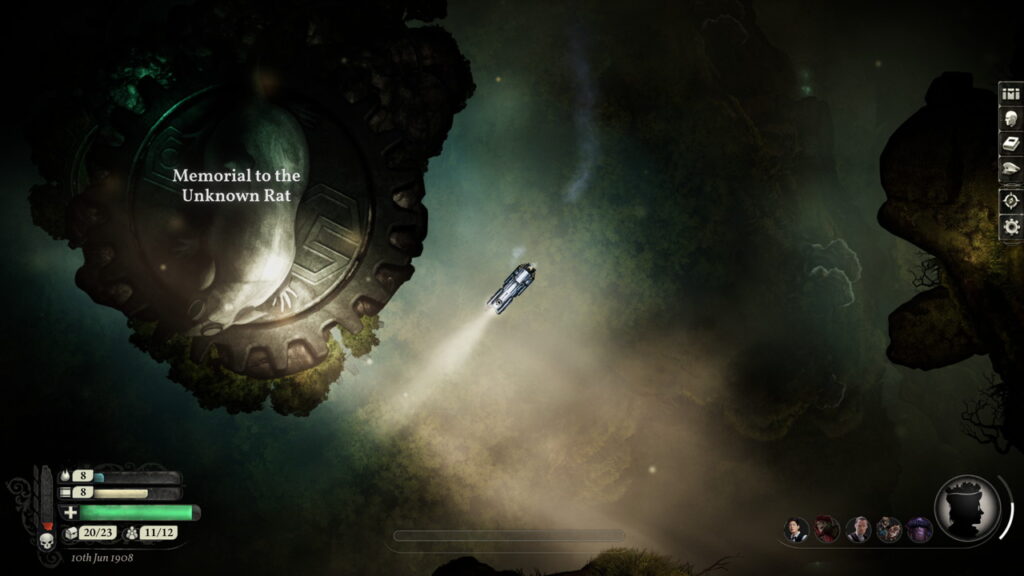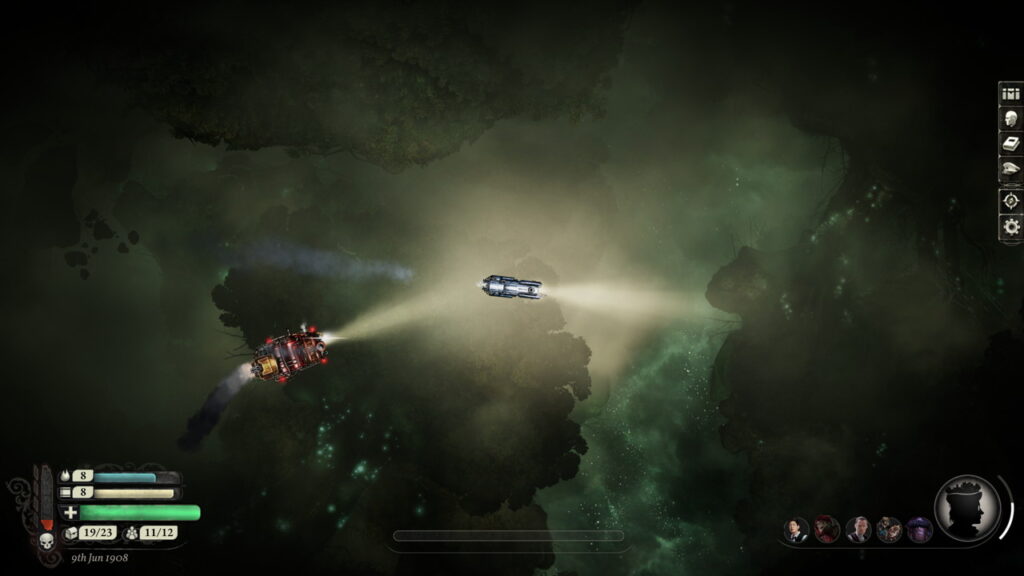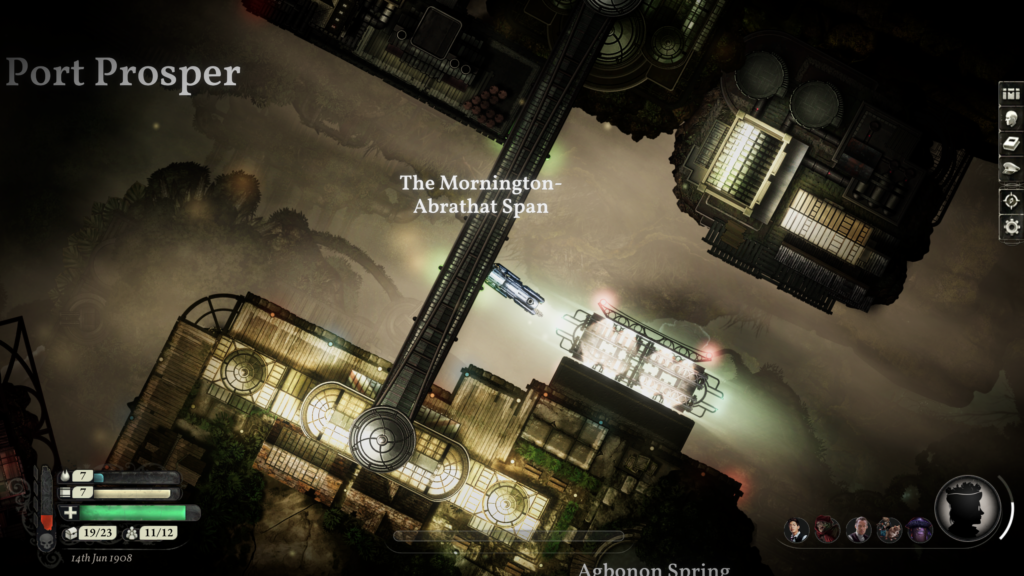This game and the next game I plan to review (Hades) have been labeled “rogue-like” or “rogue-lite” games. For the folks who read this post who don’t know that means, I’ll describe what’s generally meant by the term.
Rogue was a video game from the early 1980s. The game was originally developed to use ASCII characters for graphics, and looked something like this:

The game took its background and tropes from world of fantasy role-playing games. You played an adventurer whose goal was to reach the bottom of a dungeon filled with monsters and treasure. You selected a character class, picked up gear and money along the way, purchased items from shopkeepers. and fought monsters to build experience and skills.
The characteristics of Rogue that are referenced when using the term “rogue-like” are:
- There is no ability to create a “game save” file. If you leave the game, you can restore it to its state when you last played. However, you can’t save a game at a certain point (e.g., before a dangerous battle) and restore the game to that earlier point.
- Related to the above: “Permadeath”; that is, if your character dies in the game, that’s it. You can start a fresh character from the beginning, and that’s your only option.
- The dungeon is procedurally generated for each game. Each character will see a different maze of twisty little passages, populated by different sets of twisty little (and big) creatures.
- A consequence of the above points is that whatever your character(s) might have gained in previous run-throughs of the game does not carry over if your character dies or you choose to start a fresh game. You personally might have learned something about playing the game, but the 20,000 gold pieces gained by your 20th-level Wizard are lost if you’re careless and permit Gandalf Pendragon to die from a spider bite.
Rogue was hard. The only advantage you had is that the game did not have any kind of timer. The game would prompt you for each action (move, attack, search, etc.) and you could take as long as you wished to think about what you wanted to do.
With that definition out the way, let’s take a look at Sunless Skies.
The genre of Sunless Skies is Victorian steampunk Lovecraftian horror. It’s the third game in a “Fallen London” series from Failbetter Games; I haven’t played the first two, but I gather they were set underground and on the seas, respectively. Sunless Skies is set in space. Queen Victoria has relocated London into another realm, displacing a star and replacing it with a clockwork version.
You are a captain of a celestial steam locomotive. You travel from port to port, making trades and having adventures. All the while you must deal with hazards and monsters, both of which may damage your engine’s hull or impact on your all-too-fragile sanity.

Movement in the game is strictly two-dimensional. However, as you move there are additional visual layers that don’t affect your movement but which slide as a perspective view. It adds some visual interest to the tedious business of traveling from place to place.
As you travel, you may encounter sites of natural resources that you can pick up if your ship has the right equipment. There are regions of space that will start driving you and your crew insane. You expend fuel as you travel, more if you’re carrying a lot of cargo.
If you run out of fuel in space, you perish.
Supplies are consumed at a steady rate, depending on the size of your crew. If you don’t have enough crew your ship won’t function. On the other hand, if you run out of supplies, you may be faced with unpleasant alternatives: give the crewmen who perished due to starvation a decent burial, or consume the bodies of the dead; the latter will keep you alive but increases your insanity.
If you go insane, you perish.
If you earn the ire of various semi-deities, you can gain nightmares. If you gain too many nightmares, you perish.
Your engine’s hull is the only thing that protects you from the vacuum of space. If you lose all your hull, you perish.
Monsters, enemies, and hazards can reduce your hull. Even a glancing impact will have some effect. Once, I had to cross from the rim of a realm to its center (the only location where you can repair) with only a single hull point; the slightest impact would have destroyed the locomotive.

With all these hazards, why travel? Money, for one thing. There are opportunities for trades at most ports. You can be offered missions with various rewards, or you can just buy low and sell high. The money can be used to purchased upgrades for your engine, to increase its cargo capacity, to improve its weaponry, and to add crew quarters.
You, of course, cannot purchase secret compartments to smuggle goods from one Realm to another at great profit. Such things are so illegal that even a hint of approval in this review invites penalties.

The game’s true value is its story. When you’re at any of the ports, there are text-based storylines to pursue. There are over a dozen different factions in the game, and you can choose to establish alliances (and therefore make enemies) with any of them. You can become honored in eyes of Her Majesty Queen Victoria, you can side with the downtrodden workers striving to escape from a miserable existence, or with other factions whose goals remain mysterious even after you’ve joined.
In addition to the missions offered at ports, you can also hire officers for your vessel. They add to your personal game attributes (more on that below). They also have personal missions of their own. Many of them can be left at specific locations and will provide benefits if you visit that location again.
As I said, you play the role of the captain. You start with skills in Hearts, Irons, Veils, and Mirrors. The value of these skills affects the options you’ll be offered in the story and what equipment is available for your locomotive. You can gain (and sometimes lose) points in these skills through some missions and through the officers whom you’ve assigned roles on your engine.
You also gain skill points as you level up. Each of these gains fills in more of your character’s background which has further impact on the options in your story.

How is this game “rogue-like”?
- As noted in the figure captions above, the maps of each of the four Realms in the game are procedurally generated. If you want to learn the location of Perdurance in your game, the map in this review will not help you. You have to explore your own version of the Realm of Albion to find it.
- If your captain perishes or goes insane, you have a choice:
- You can choose to continue as a new character in the same game; this is called a “lineage”. You retain the engine from your previous captain, minus one item of gear. You also retain any goods you’ve banked and half the money the previous captain had earned (tip: convert as much cash as you can into goods and leave them in the bank). The missions completely reset, though there are a few world changes that are retained within the lineage. Some portions of the maps you’ve revealed become hidden again. I tried this once. I considered the prospect of redoing all the missions as a new captain, and decided I didn’t have the patience for it. (I should point out that restarting the missions means you can set different goals and make different choices in the story.) Since I’m a sysadmin, I located the game state files and restored them using Apple’s Time Machine.
- You can restore the game to the last save point. The game saves itself automatically every time you dock at a port. This can be annoying if you’ve navigated through a horde of Scriveners only to explode because you foolishly rammed into a wall just short of your destination.
I never completed the game. After reaching somewhere between halfway to two-thirds through the overall storyline, I got bored of the repetitive and hazardous traveling between ports. Coming from someone who slogged all the way through Red Dead Redemption 2, that’s quite a complaint!
Nonetheless, I recommend Sunless Skies for anyone who’s a fan of the gothic horror genre. It captures the feeling of steadily increasing insanity in cold light of uncaring space. The game requires patience, but rewards that patience with a interesting and adaptive story.
Pingback: Dredge – The Argothald Journal